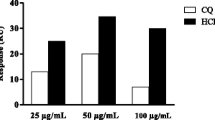Abstract
In a study of the supposed selective action of tryptophan-N-formylated gramicidin (NFG) on infected erythrocytes as well as the relationship between the ability of NFG to inhibit parasite growth and its capacity to induce potassium leakage from infected cells, a series of experiments was performed in which in vitro cultures of Plasmodium falciparum were incubated with NFG or gramicidin. Those cultures were subsequently assayed for intracellular sodium and potassium contents, cell lysis, and/or parasite viability. It is shown and discussed that although NFG can attack both infected and uninfected erythrocytes, resulting in potassium efflux from and sodium influx into these cells, the effects are much greater on infected erythrocytes than on uninfected ones. Furthermore, the results strongly suggest that NFG-mediated potassium efflux is the direct cause of parasite death.
Similar content being viewed by others
Author information
Authors and Affiliations
Additional information
Received: 12 June 1996 / Accepted: 18 August 1996
Rights and permissions
About this article
Cite this article
Otten-Kuipers, M., Coppens-Burkunk, G., Kronenburg, N. et al. Tryptophan-N -formylated gramicidin causes growth inhibition of Plasmodium falciparum by inducing potassium efflux from infected erythrocytes. Parasitol Res 83, 185–192 (1997). https://doi.org/10.1007/s004360050230
Issue Date:
DOI: https://doi.org/10.1007/s004360050230




